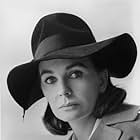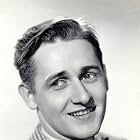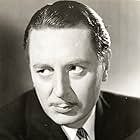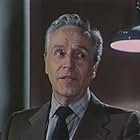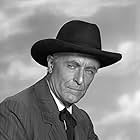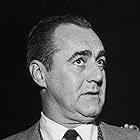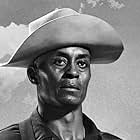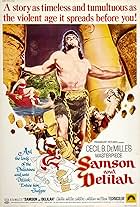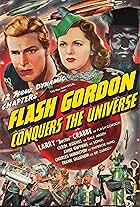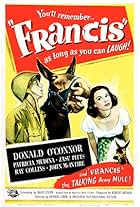IMDb RATING
6.0/10
1.1K
YOUR RATING
Story of a Christian in ancient Rome who befriends a lion.Story of a Christian in ancient Rome who befriends a lion.Story of a Christian in ancient Rome who befriends a lion.
Abdullah Abbas
- Gladiator
- (uncredited)
Doris Barton
- Vestal Virgin
- (uncredited)
Mary Bayless
- Christian
- (uncredited)
Chet Brandenburg
- Christian
- (uncredited)
- Directors
- Writers
- All cast & crew
- Production, box office & more at IMDbPro
Storyline
Did you know
- TriviaAfter principal filming was completed, Howard Hughes decided the film needed some extra sprucing up. He had Nicholas Ray shoot a "Vestal Virgin Bathing Sequence" which immediately ran afoul with censors and enraged producer Gabriel Pascal, amongst others. The sequence was eventually deleted from release prints.
- GoofsThe Christians sing "Onward, Christian Soldiers" - a hymn published in 1871.
- Crazy creditsOpening credits prologue: ROME 161 A.D. IN THE REGION OF THE EMPEROR ANTONINUS
- ConnectionsFeatured in It's Showtime (1976)
- SoundtracksOnward, Christian Soldiers
(uncredited)
Music by Arthur Sullivan
Words by Sabine Baring-Gould
Sung by the marching Christians
Featured review
George Bernard Shaw put great trust in Gabriel Pascal and that trust was pretty well justified but one cannot help wondering what our second greatest playwright, had he lived to see it, would have thought of this sorry version of his two act play.
It is not one of Shaw's greatest works to be sure but it deserved better than to be turned into a second rate 'sword-and-sandals' movie.
Lovely Jean Simmons is Lavinia, one of Shaw's customary strong, independent women who resists the manly charms of the 'handsome Captain' played by Victor Mature. Most of Mr. Mature's speeches have been cut which I'm sure was as much a relief to him as it is to us. He remains one of Hollywood's most accomplished Cigar Store Indians. As a Christian martyr Miss Simmons is warming up for her role as Diana in 'The Robe'. At the end Lavinia and the Captain agree to meet up occasionally in order to 'argue'. The mind boggles!
The only character whose Shavian dialogue remains largely intact is that of Ferrovious who is played superbly by Robert Newton. By far the best scene in the film is where he turns the other cheek to the Lentulus of Reginald Gardiner. Ferrovious is a man of violent disposition who has become a gentle giant since his conversion to Christianity. It is one of Shaw's trademark paradoxes that this man of peace, having slain a few gladiators, accepts an offer from the Emperor to join the Praetorian Guard. This is a theatrical device by which Shaw draws our attention to the horrors perpetrated by Mankind whilst holding a weapon in one hand and a Bible in the other.
The Emperor is one of Shaw's 'cynics' but Maurice Evans alas lacks the required bite. Such a pity that George Sanders, considered for the role, was unavailable.
Shaw's love of animals is evident here in his depiction of the Lion. It is played by Woody Strode, who later described this as his most difficult role!
I have purposely left the Androcles of Alan Young until last as his casting is without doubt the most contentious.
By all accounts he was a replacement for Harpo Marx, surely one of the greatest clowns of all time. This showed a lamentable error of judgement on the part of Howard Hughes and must have contributed to the film's failure. Mr. Young enjoyed a long and successful career but this role requires far more than he is able to give. That is the politest way I can think of putting it.
Apparently, in order to spice things up, Nicholas Ray was brought in to direct an extra 'Vestal Virgin bathing scene' which unsurprisingly never made it to the screen. The film would not be complete of course without the mandatory close-ups of Roman ladies licking their lips at the prospect of seeing someone torn limb from limb.
Chester Erskine is no Nicholas Ray and under his direction Shaw's 'fable' is just plain feeble.
It is not one of Shaw's greatest works to be sure but it deserved better than to be turned into a second rate 'sword-and-sandals' movie.
Lovely Jean Simmons is Lavinia, one of Shaw's customary strong, independent women who resists the manly charms of the 'handsome Captain' played by Victor Mature. Most of Mr. Mature's speeches have been cut which I'm sure was as much a relief to him as it is to us. He remains one of Hollywood's most accomplished Cigar Store Indians. As a Christian martyr Miss Simmons is warming up for her role as Diana in 'The Robe'. At the end Lavinia and the Captain agree to meet up occasionally in order to 'argue'. The mind boggles!
The only character whose Shavian dialogue remains largely intact is that of Ferrovious who is played superbly by Robert Newton. By far the best scene in the film is where he turns the other cheek to the Lentulus of Reginald Gardiner. Ferrovious is a man of violent disposition who has become a gentle giant since his conversion to Christianity. It is one of Shaw's trademark paradoxes that this man of peace, having slain a few gladiators, accepts an offer from the Emperor to join the Praetorian Guard. This is a theatrical device by which Shaw draws our attention to the horrors perpetrated by Mankind whilst holding a weapon in one hand and a Bible in the other.
The Emperor is one of Shaw's 'cynics' but Maurice Evans alas lacks the required bite. Such a pity that George Sanders, considered for the role, was unavailable.
Shaw's love of animals is evident here in his depiction of the Lion. It is played by Woody Strode, who later described this as his most difficult role!
I have purposely left the Androcles of Alan Young until last as his casting is without doubt the most contentious.
By all accounts he was a replacement for Harpo Marx, surely one of the greatest clowns of all time. This showed a lamentable error of judgement on the part of Howard Hughes and must have contributed to the film's failure. Mr. Young enjoyed a long and successful career but this role requires far more than he is able to give. That is the politest way I can think of putting it.
Apparently, in order to spice things up, Nicholas Ray was brought in to direct an extra 'Vestal Virgin bathing scene' which unsurprisingly never made it to the screen. The film would not be complete of course without the mandatory close-ups of Roman ladies licking their lips at the prospect of seeing someone torn limb from limb.
Chester Erskine is no Nicholas Ray and under his direction Shaw's 'fable' is just plain feeble.
- brogmiller
- Nov 17, 2020
- Permalink
- How long is Androcles and the Lion?Powered by Alexa
Details
- Release date
- Country of origin
- Language
- Also known as
- Bernard Shaw's Androcles and the Lion
- Filming locations
- Production company
- See more company credits at IMDbPro
Box office
- Budget
- $1,250,000 (estimated)
- Runtime1 hour 38 minutes
- Color
- Aspect ratio
- 1.37 : 1
Contribute to this page
Suggest an edit or add missing content

Top Gap
By what name was Androcles and the Lion (1952) officially released in India in English?
Answer









